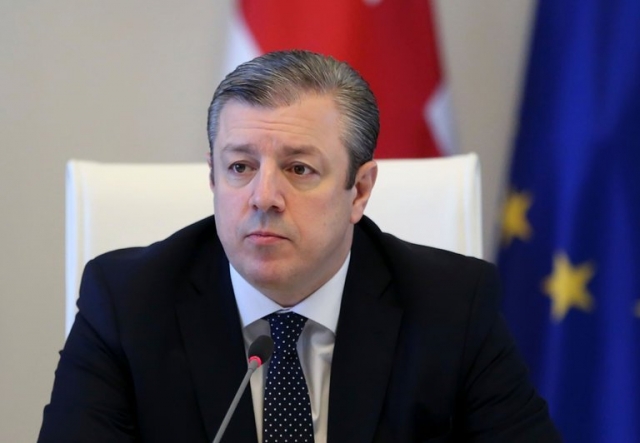Georgian PM Comments on New Constitution
The Prime Minister of Georgia, Giorgi Kvirikashvili, has released a statement regarding the final version of the constitution, ratified by Parliament on March 23.
The PM said thta now the country has "a flawless Constitution" which ensures stability and pluralism, and ensures against inadequate concentration of power in the hands of one force, so eliminating the possibility of autocracy.
“We have adopted a Constitution that ensures Georgia's democratic development," he said. "I would like to thank everyone who has contributed to the successful completion of this process: the Constitutional Commission, the Speaker of Parliament, Irakli Kobakhidze, experts, society, our citizens, and everyone who has taken part in the general debates. I would like to express our special gratitude to the Venice Commission, particularly Gianni Buquicchio who has been involved throughout the process and who has highly commended the constitutional amendments.
"Immediately after assuming power, our political team started to work towards remedying the Constitution and as early as 2013, we took steps to enhance parliamentary control and the role of the Georgian Parliament. The Constitution no longer contains a provision vesting a disproportionate amount of power in the executive branch, this way depriving Parliament of a mechanism to reject bills proposed by the Prime Minister.
"This trend continued throughout the development of the new version. We, the ruling team and the executive branch, took the path of maximal limitation of power.
"I would like to state with all assuredness that no provision serving the partisan interests of the ruling political force, or improving its positions, has been included in the new version of the Constitution. Our goal has been for the country to have a balanced constitution, and for us to switch to a model of full parliamentary rule.
"During the work on the new version, unprecedented all-inclusive public debates were held throughout the country. The Constitutional Commission invited experts and representatives of the opposition parties. The Commission took into account almost 80% of the expert recommendations, which is also unprecedented in the country's history.
"In developing these constitutional amendments, we rejected the years-long malicious practice of a constitution tailored to suit narrow partisan interests and particular persons. From this day on, the country has a constitution that balances and distributes responsibility among the branches of government, with the Parliament enjoying its natural role and authority: with simplified parliamentary procedures for votes of no confidence in the government; with a more effective and accountable executive government; with the president fulfilling the functions of a neutral arbiter. The Constitution's transitional provisions reflect the country's foreign policy choice, with greater protection of human beings and society as a whole, enhanced rights of the parliamentary opposition which is now entitled to establish special investigative parliamentary commissions, with the state's greater social responsibility, and an improved level of protection of labor rights, and stronger guarantees of judicial independence.
"In addition, the new version reflects the request of our public to define marriage, and the request of the great majority of our country's population concerning restrictions to the alienation of land. The primary goal of all these steps is to ensure the country's democratic development and, at the same time, reaching political consensus. It was through the political will of our team that the document stipulates the country's complete switchover to proportional representation in 2024. Throughout the constitutional debates, we repeatedly pointed to a difference of opinion within our team on a possible transition to proportional representation in 2020. Although the 2020 parliamentary elections will employ a mixed electoral system, the election threshold will be lowered from 5% to 3%. At the same time, forming political blocks will be kept as a one-shot exception.
"This issue has been constantly debated, yet actual and effective steps have been taken only by our government. In addition, the recent amendments abolish the bonus system, which means that undistributed seats will be allocated proportionately among the parties that achieve the election threshold. These amendments invalidate any conjecture on this issue from the opponents.
"I am convinced that our society duly appreciates the progress achieved by our country through the adoption of a balanced constitution, which must serve as the precondition and guarantor of our country's democratic development and progress,” the PM’s statement reads.












